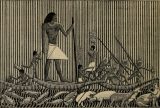Worried About Biden’s Age? Consider Claudius
The Ancient Roman Emperor Was Mocked as Feeble, But Ruled Wisely
Those who criticize President Biden as “too old” or “slow” or “confused” might learn something from the very similar treatment of the Roman emperor Claudius.
Claudius, who ruled from 41 to 54 CE, was the most effective and successful member of the Julio-Claudian dynasty, apart from Augustus. He was also the only emperor mocked as weak-willed and feeble. Claudius grew up a sickly, unattractive child with a limp and a speech impediment. His own family teased and derided him, in his early years and beyond. Like other Romans, they saw his …










